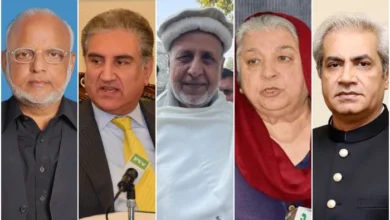ISLAMABAD: The Ittehad Tanzeemat-i-Madaris Pakistan on Tuesday deviated from a 2019 stance and announced that “seminaries will not become part of any government department and remain autonomous.”
The seminaries organisation had in 2019 agreed to come under the control of the federal education ministry.
The Ittehad issued a statement after a delegation met JUI-F chief Maulana Fazlur Rehman at his residence to support him as he is stressing the government to issue a gazette notification for the Societies Registration (Amendment) Bill 2024, which would roll back the 2019 agreement and make the district administration the authority to register seminaries.
In the statement, Mufti Taqi Usmani said the boards took the decision to become subservient to the education ministry under pressure, as at that time they thought it was better to be under the control of the education ministry than anyone else.
The Mufti announced that seminaries would remain autonomous and would not become subservient to authorities in Pakistan like in Saudi Arabia, the UAE, and Egypt.
The joint delegation comprised madrasa boards of the Barelvi, Deobandi, Shia and Ahle Hadith schools of thought, and the Jamaat-i-Islami.
MQM ALSO CHANGES STANCE
Meanwhile, the MQM also changed its stance on the registration of seminaries and announced support for the Maulana on this issue.
In a joint press conference with Maulana Fazl after a meeting at his residence, MQM chief Khalid Maqbool Siddiqui urged the government to proceed with the proposed legislation by removing unnecessary hurdles.
Maulana Fazl urged the government to “accept our demand to avoid conflict.” He criticised the government for complicating the matter and said the bill was passed by parliament, but disrupted by the presidency.
“We demand its gazette notification, and if there are any amendments required they can be done later,” the JUI-F chief added.
Siddiqui said the Maulana’s arguments carry weight. “We will convey his message. We had a positive conversation.”
He said the matters agreed in the 26th Amendment should be implemented. “Talks can be held even after the gazette notification,” he added.
It may be recalled that a few days ago, Siddiqui, who also holds the federal education portfolio, sat alongside government ministers and clerics to oppose the bill at a government-sponsored conference, where he described the issue as “a matter of national security”.











